Ask questions which are clear, concise and easy to understand.
Ask QuestionPosted by Ankita ?? Arpita☺️ 5 years, 7 months ago
- 1 answers
Posted by Nikesh Biswakarma 5 years, 7 months ago
- 1 answers
Posted by Aman Jaiswal 5 years, 7 months ago
- 1 answers
Gaurav Seth 5 years, 7 months ago
Statement of Gauss"s Theorem : The net-outward normal electric flux through any closed surface of any shape is equal to
1/ε0 times the total charge contained within that surface , i.e.,

over the whole of the closed surface, q is the algebraic sum of all the charges (i.e., net charge in coulombs) enclosed by surface S.
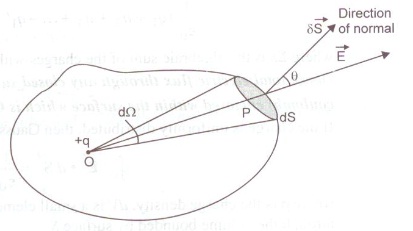
Proof of Gauss"s Theorem :
Let a point charge +q coulomb be placed at O within the closed surface. Let E be the electric field strength at P. Let
OP= r and the permittivity of free space or vaccuum be ε0.
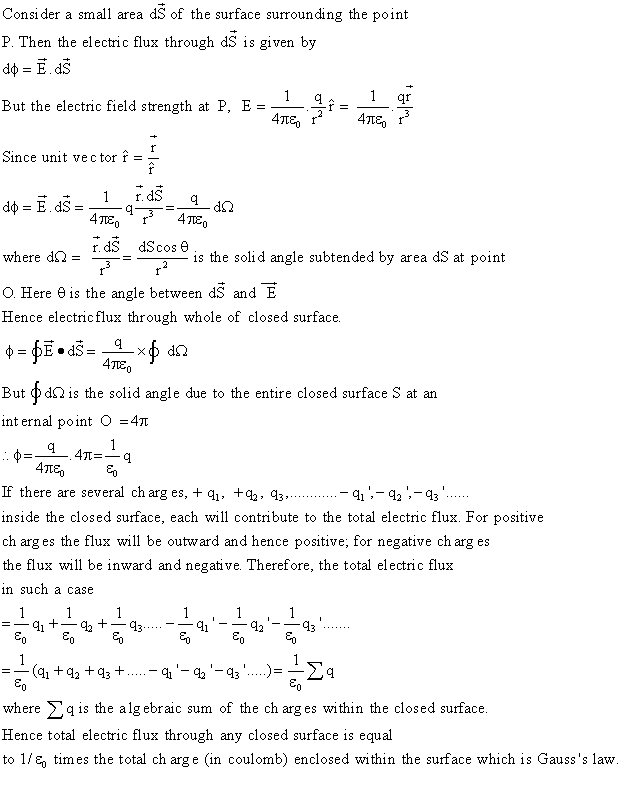
Posted by Prachi Prachi 5 years, 7 months ago
- 1 answers
Yogita Ingle 5 years, 7 months ago
For a single conductor the capacity represents its ability to hold maximum possible amount of charge and it is measured as the ratio of charged given to the electric potential acquired by a conductor.
ie., C = q / V.
Posted by Vinay Aggarwal 5 years, 7 months ago
- 1 answers
Posted by Ayush Agrawal 5 years, 7 months ago
- 3 answers
Posted by Krishna Kumar 5 years, 7 months ago
- 1 answers
Posted by Naveen Singh 5 years, 7 months ago
- 1 answers
Yogita Ingle 5 years, 7 months ago
Force F acting on a charged particle of charge q in electric field E is given by, F = (q/m)E
( bold letters F and E are vectors )
If a charged particle moves in the direction of electric field, Then it is accelerated and will move in same direction of electric field.
But if a charged particle moves in a direction and not in parallel to electric field, it moves in a parabolic path.
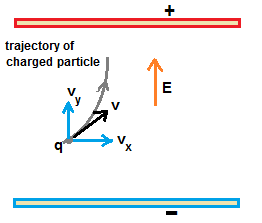
Let v be the velocity and E be the electric field as shown in figure.
Let at t=0, y-component of velocity be vy0
then vertical displacement y after a time duration t is given by, y = vy0 t + (1/2) a t2 .................(1)
acceleration a = qE/m and t = x/vx , where x is horizontal displacement , vx component is unaffected by electric field
Hence eqn.(1) is written as, y = vy0 (x/vx) + (1/2) a (x/vx)2 .......................(2)
vertical position y as given by eqn.(1) is in parabolic curve of type y = a x + b x2
Force F experienced by the charge particle of charge q in a magnetic field B is given by,
F = q v × B ...................(3)
where v is velocity of charged particle and B is magnetic field. Eqn.(3) is cross product of vectors.
Hence magnitude of force |F| = |v| |B| sinθ , where θ is the angle between magnetic field direction and velocity of charged particle.
If charged particle velocity is parallel to magnetic field, force acting on charged particle will be zero.
Otherwise, force acting on charged particle is perpendicular to veleocity of particle .
Any moving particle subjected to a force in perpendicular direction to its moving direction will move in a circular path
Posted by Ajay Yadav 5 years, 7 months ago
- 1 answers
Meghna Thapar 5 years, 7 months ago
Hooke's Law is a principle of physics that states that the force needed to extend or compress a spring by some distance is proportional to that distance. Hooke's law was discovered by the English scientist Robert Hooke in 1660, which states that, for relatively small deformations of an object, the displacement or size of the deformation is directly proportional to the deforming force or load. Hookes law is important because it helps us understand how a stretchy object will behave when it is stretched or compacted. It relates to our everyday lives because without it, we would have a difficult time tweaking shocks on cars. We use cars everyday, and the shocks are what keep the ride smooth.
Posted by Ajay Yadav 5 years, 7 months ago
- 1 answers
Meghna Thapar 5 years, 7 months ago
Hooke's Law is a principle of physics that states that the force needed to extend or compress a spring by some distance is proportional to that distance. Hooke's law was discovered by the English scientist Robert Hooke in 1660, which states that, for relatively small deformations of an object, the displacement or size of the deformation is directly proportional to the deforming force or load. Hookes law is important because it helps us understand how a stretchy object will behave when it is stretched or compacted. It relates to our everyday lives because without it, we would have a difficult time tweaking shocks on cars. We use cars everyday, and the shocks are what keep the ride smooth.
Posted by Bhawana Kumari Kabawat 5 years, 7 months ago
- 5 answers
Riya Shekhawat❤️ 5 years, 7 months ago
Yogita Ingle 5 years, 7 months ago
The quantization of electric charge means that the total charge of the body is always an integral multiple of a basic quantum of charge (e) i.e
q = ne where, n = 0, ±1, ±2, ±3, .....
The basic cause of quantization of electric charge is that during rubbing only an integral number of electrons can be transferred from one body to another.
Khushi....? ??? 5 years, 7 months ago
Posted by All In One 5 years, 7 months ago
- 1 answers
Posted by Abhishek Mishra 2 5 years, 7 months ago
- 3 answers
Posted by Satyendra Kumar 5 years, 7 months ago
- 1 answers
Yogita Ingle 5 years, 7 months ago
In one second 109 electrons move out of the body. Therefore the charge given out in one second is 1.6×10−19× 109C = 1.6×10-10C.
The time required to accumulate a charge of 1 C can then be estimated to be 1C÷ (1.6 × 10−10C/s)= 6.25×109s = 6.25 × 109÷(365 × 24 × 3600) years = 198 years. Thus to collect a charge of one coulomb, from a body from which 109 electrons move out every second, we will need approximately 200 years. One coulomb is, therefore, a very large unit for many practical purposes. It is, however, also important to know what is roughly the number of electrons contained in a piece of one cubic centimetre of a material.
A cubic piece of copper of side 1 cm contains about 2.5×1024 electrons.
Posted by K Sharma 5 years, 7 months ago
- 4 answers
Khushi....? ??? 5 years, 7 months ago
Posted by Deepanshu Kanwal 5 years, 7 months ago
- 1 answers
Posted by Shraddha Kansal 5 years, 7 months ago
- 2 answers
Gaurav Seth 5 years, 7 months ago
Solution :
The power dissipated in a circuit is
p=I square R
Hence P∞I square
If I=3 I, then P=9P
Hence the power dissipated is 9 times
Answer : 9 times
Posted by Riya Sharma 5 years, 7 months ago
- 1 answers
Gaurav Seth 5 years, 7 months ago
There is net inward flux. This means that there must be a negative charge at or else such a field configuration is not possible. This then means that in static condition a positive charge can only be in stable equilibrium on the head of a negative charge and not by any other method.
Posted by [email protected] Yadav Ji 5 years, 7 months ago
- 1 answers
Yogita Ingle 5 years, 7 months ago
- Electricity is a form of energy produced by charges.
- These charges can be at rest or moving.
Posted by Mr. Badmash 5 years, 7 months ago
- 2 answers
Khushi....? ??? 5 years, 7 months ago
Posted by Gudiya Chaurasiya Gudiya Chaurasiya 5 years, 7 months ago
- 1 answers
Gaurav Seth 5 years, 7 months ago
Here,
I = current in the loop
R= radius of the loop
X= distance between O and P
dl = conducting element of the loop
According to the Biot-Savart law,
Magnetic field at point P is,
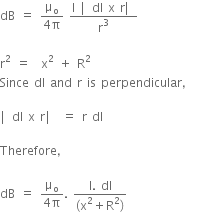
dB has two components: dBx and  .
.
 is cancelled out and the x-component remains.
is cancelled out and the x-component remains.
Therefore,
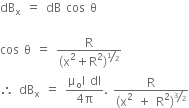
Summation of dl over the loop is given by,
B = 
Posted by Gudiya Chaurasiya Gudiya Chaurasiya 5 years, 7 months ago
- 2 answers
Gaurav Seth 5 years, 7 months ago
Welders wear special goggles with glass windows to protect the eyes from Ultra Violet rays also known as UV rays. Goggles provide them a degree of eye protection from heat, optical radiation and sparks produced by the welding. Welding produces UV and IR radiations which cannot be seen by naked eye and can produce eye injury If special goggles are not wear. UV blocking protective welding goggles are considered primary protection, with this eyes are still protected even when the face shield or helmet is lifted up. Ultraviolet rays UV rays have frequency range 400nm to 0.6nm. Where nm denotes Nanometers
Yogita Ingle 5 years, 7 months ago
A welder wears special glasses to protect his eyes mostly from the harmful effects of the ultraviolet rays produced during welding.
Welding is the process of joining two substances (usually metals) by heating them enough to melt them and then allowing them to solidify.
Ultraviolet rays are electromagnetic waves that have wavelength less than 400nm ( that is less than the wavelength of violet light).
The special glasses of welders absorbs these ultraviolet rays and protect the eyes of welders from the harmful effects of ultraviolet rays.
Posted by Gudiya Chaurasiya Gudiya Chaurasiya 5 years, 7 months ago
- 0 answers
Posted by Madhusmita Das 5 years, 7 months ago
- 0 answers
Posted by Mr. Badmash 5 years, 7 months ago
- 1 answers
Posted by Arun Rathee 5 years, 7 months ago
- 0 answers

myCBSEguide
Trusted by 1 Crore+ Students

Test Generator
Create papers online. It's FREE.

CUET Mock Tests
75,000+ questions to practice only on myCBSEguide app
 myCBSEguide
myCBSEguide

Gaurav Seth 5 years, 7 months ago
about 5.5 x 1014 Hz
The human eye is most sensitive to light with a frequency of about 5.5 x 1014 Hz, which is in the yellow-green region of the electromagnetic spectrum.
0Thank You